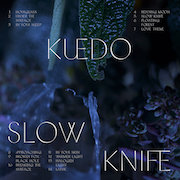In hindsight, Vex’d’s seminal 2005 dubstep masterpiece Degenerate was already an attempt to look past the genre’s established aesthetic and avoid it becoming stale, with its aggressive bass charges and rattling beats presenting a dystopian, futuristic form of bass music that felt abrasive and vital even so early on in dubstep’s history. Degenerate seemed a mile away from the more accessible music of a Skream or a Burial, and eleven years on, one half of Vex’d, Jamie Teasdale, is continuing to consider where the staples set down by the first dubstep rush of 2003-2007 can go once the world gets over-familiar with them. Using his Kuedo moniker, he already evinced a certain trajectory on his 2011 debut, Severant, and it seems he has been using the subsequent five years, in between the odd reunion with former Vex’d compadre Roly Porter, to forge even further ahead, and with greater ambition.
On Severant, Teasdale took the bass thump of dubstep and threw it open to the jittery percussion of the Chicago scene and the spacey synths from Detroit, creating a form of futuristic dance music that conjured up images of neon cities and automated lifestyles. It was if he was deliberately wrenching the genre in which he’d made his name out of the modern urban sprawl it grew out of and repositioning it as a proposed form of sci-fi expressionism for time yet to take shape. On Slow Knife, his new album on the ever-respectable electronica label Planet Mu, Teasdale continues to delve into a sci-fi future sketched from a mixture of collective consciousness and modern musical technology, but the atmosphere is altogether more sombre and nocturnal. If Severant felt like a musical reflection of the teeming plazas from the anime version of Metropolis, Slow Knife is a walk through the perpetual rain in Blade Runner’s Los Angeles.
‘Hourglass’ opens the album in portentous fashion with gaseous drones and a bell-like pad motif, everything pitched into the lower register. The familiar click-clack rhythmic pattering that underlined many of the tracks on Severant and a loping bass line inch the tune towards the dancefloor, but the pace is languid and hypnotic, so it’s only a slightly nod to dubstep’s club beginnings. The swooping, Vangelis-like synths create an instant atmosphere of vague melancholy, with Teasdale tapping into the latent retro-futuristic spirit that made the soundtrack to Stranger Things such an integral part of the series’ appeal. ‘Under the Surface’ picks up the baton with wispy, phantomatic textures that could be sampled voices but instead sound like smoke billowing out of ruptured air vents. All hints of dance or techno are but remote afterimages, with ‘Under the Surface’ setting the template for roughly half the album: dark, moody and ghostly ambience. Even the next track, the slinky ballad-like pop gem ‘In Your Sleep’, with Wild Beasts’ Hayden Thorpe on vocals, feels less like a modern-day single and more like a futuristic equivalent of a nocturnal blues number sung during a jazz set at midnight in a smoky bar in 30s New York.
The second half of Slow Knife, however, sees Teasdale gradually edging through the darkness and the fog, as indicated by track titles such as ‘Breaking the Surface’, ‘Warmer Light’ and ‘Love Theme’. ‘In Your Sleep’ already indicates a romantic longing hidden underneath the harsher moments of the first half, and ‘Love Theme’, for example, is closer to an Angelo Badalamenti soundtrack than the icy futurism of “Under the Surface”. It’s a tortuous journey towards the warmer light, however, one that involves negotiating the brittle chiaroscuro of ‘Broken Fox – Black Hole’, with its cacophonous lumps of noise that pierce through the veils of drifting atmospherics provided by Teasdale and the unnerving string interventions of Koenrad Ecker. Similar harsh noise punctuates ‘Breaking the Surface’, whilst ‘Halogen Light’ is built on unsettling crepuscular field recordings and a mournful, minimalist piano loop. But ‘Warmer Light’ is just that: a surge of synth drone that moves through a multitude of emotional states, from the despairing to the ecstatic and back to melancholic. Strains of Tim Hecker and Tangerine Dream are apparent, threatening to reduce the dubstep origins of this music to a mere echo, and then out of nowhere Kuedo drops in an infectious beat and chiming guitar motif, as if daring the listener not to dance even as it seems so counterintuitive. He then closes the album with ‘Lathe’, perhaps the most superficially dubstep track on the album.
It’s hard to tell if Slow Knife is intended as a sort of sci-fi concept album or not, for it certainly shares a lot of cues with Pye Corner Audio’s excellent recent album, Stasis, although that release is more blatantly retro. Instead, it’s better to view Kuedo’s latest album as an exploration of where dance and electronic music, and specifically dubstep, are in 2016, so long after Degenerate was first recorded. In Kuedo’s hands, they’ve landed in nebulous terrain, drifting between possibilities of rhythm and bass, atmosphere and drone, noise and melody. It’s a beautifully complex tapestry.


